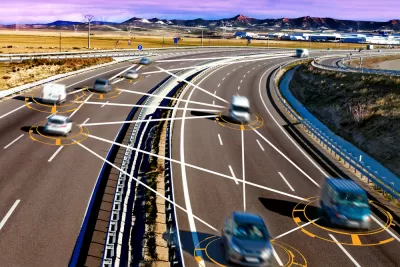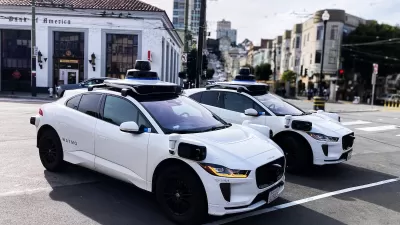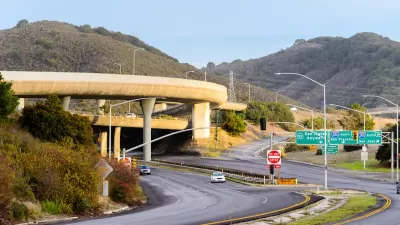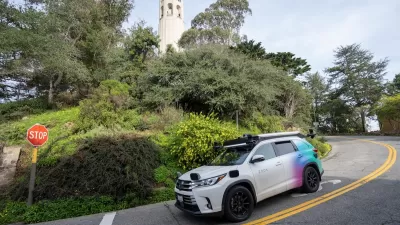The complex algorithms used by self-driving vehicle technology use massive amounts of energy, which could lead to a steep rise in carbon emissions as autonomous cars become more commonplace.

A new study from the Massachusetts Institute of Technology (MIT) warns that, without changes in technology, the growth of autonomous vehicles will spur massive energy consumption. As Rima Sabina Aouf reports in Dezeen, “The study found that with a mass global takeup of autonomous vehicles, the powerful onboard computers needed to run them could generate as many greenhouse gas emissions as all the data centres in operation today.”
As Aouf explains, “The high emissions are the result of the huge computing workload placed on each self-driving vehicle.” The vehicles use ‘deep neural networks’ to constantly make inferences that drive decisions. According to the study, “One billion vehicles would make 21,600 trillion inferences. To put that into perspective, the researchers say all of Facebook's data centres worldwide currently make a few trillion inferences each day.”
Study co-author Soumya Sudhakar says that “If we just keep the business-as-usual trends in decarbonisation and the current rate of hardware efficiency improvements, it doesn't seem like it is going to be enough to constrain the emissions from computing onboard autonomous vehicles.”
Autonomous car manufacturers can get ahead of the problem by working to improve the efficiency of their hardware and algorithms. “In a scenario where 95 per cent of global vehicles are autonomous in 2050, the study suggests that the technology's efficiency must double about every 1.1 years, such that each autonomous vehicle is consuming less than 1.2 kilowatts of energy for computing.”
FULL STORY: MIT study finds huge carbon cost to self-driving cars

Alabama: Trump Terminates Settlements for Black Communities Harmed By Raw Sewage
Trump deemed the landmark civil rights agreement “illegal DEI and environmental justice policy.”

Study: Maui’s Plan to Convert Vacation Rentals to Long-Term Housing Could Cause Nearly $1 Billion Economic Loss
The plan would reduce visitor accommodation by 25% resulting in 1,900 jobs lost.

Planetizen Federal Action Tracker
A weekly monitor of how Trump’s orders and actions are impacting planners and planning in America.

Wind Energy on the Rise Despite Federal Policy Reversal
The Trump administration is revoking federal support for renewable energy, but demand for new projects continues unabated.

Passengers Flock to Caltrain After Electrification
The new electric trains are running faster and more reliably, leading to strong ridership growth on the Bay Area rail system.

Texas Churches Rally Behind ‘Yes in God’s Back Yard’ Legislation
Religious leaders want the state to reduce zoning regulations to streamline leasing church-owned land to housing developers.
Urban Design for Planners 1: Software Tools
This six-course series explores essential urban design concepts using open source software and equips planners with the tools they need to participate fully in the urban design process.
Planning for Universal Design
Learn the tools for implementing Universal Design in planning regulations.
Caltrans
Smith Gee Studio
Institute for Housing and Urban Development Studies (IHS)
City of Grandview
Harvard GSD Executive Education
Toledo-Lucas County Plan Commissions
Salt Lake City
NYU Wagner Graduate School of Public Service





























